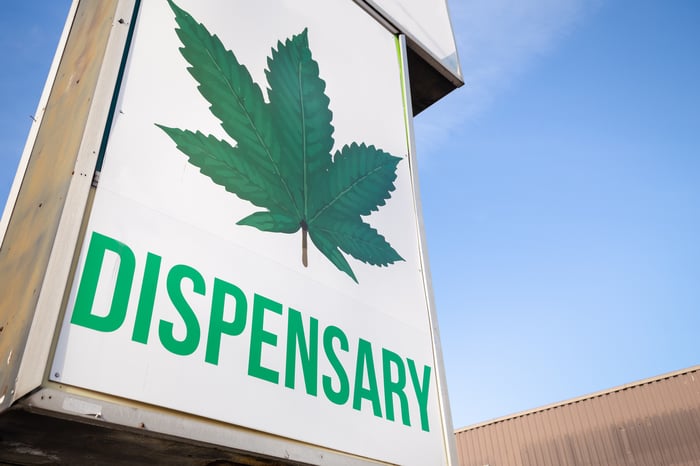Though investors' eyes are squarely on tech stocks, it's marijuana that could be one of the fastest-growing industries in North America over the next decade.
The latest edition of Marijuana Business Factbook from Marijuana Business Daily forecasts that legal weed sales in the U.S. could potentially triple to as much as $37 billion by 2024. With more U.S. states giving the green light to recreational and medical cannabis every year, and the Canadian industry working out its kinks, the sky's the limit for North American pot stocks -- well, most of them at least.
Even the fastest-growing industries have laggards that should be avoided at all costs by investors. In November, there are three pot stocks that cannabis stock investors would be wise to steer clear of.

Image source: Getty Images.
Canopy Growth
First up is Canopy Growth (CGC 3.10%), the largest pure-play marijuana stock by market cap.
There's a lot that investors seem to like about Canopy. For instance, it has the largest cash pile of any pure-play pot stock, and spirits giant Constellation Brands (STZ -4.50%) owns a nearly 38% stake in the company. This cash pile acts as something of a downside buffer for Canopy's share price, while Constellation serves as an invaluable (and vested) partner in its future.
However, any positives that investors can come up with for Canopy Growth will take a backseat to three sizable negative catalysts.
To begin with, Canopy Growth, like its Canadian licensed peers, is having to head-to-head with low-priced illicit cannabis from the black market. A combination of having to delay the launch of higher-margin derivatives, coupled with the strength of value cannabis, means Canopy Growth's margins are sinking.
Second, the company is losing money hand over fist. Even after shuttering 3 million square feet of licensed indoor cultivation, passing on the opening of the Niagara-on-the-Lake facility, laying off workers, and substantially cutting back on share-based compensation, Canopy Growth still lost $108.5 million Canadian dollars in the fiscal first quarter (ended June 30). It should be noted that even with substantive share-based compensation cuts, this expense still accounted for close to CA$31 million in first-quarter 2021 costs. According to Wall Street, it could be another four years before the company pushes into the profit column.
Third, the company's cash buffer isn't as safe as you might think. This cash pile stood at close to CA$5 billion following a November 2018 investment from Constellation Brands but has been whittled down to a little over CA$2 billion. Keep in mind this CA$2 billion includes CA$245 million from Constellation Brands exercising warrants earlier this year. Without this extra cash, Canopy would have burned through two-thirds of its cash in under two years.
In spite of its brand name and cash pile, Canopy Growth should be avoided by investors.

Image source: Getty Images.
Harvest Health & Recreation
Although U.S. pot stocks offer considerably more upside than Canadian licensed producers, not every U.S. marijuana stock is worth your hard-earned money. In November, vertically integrated multistate operator (MSO) Harvest Health & Recreation (HRVSF) is a name I'd suggest avoiding.
Around this time last year, I was actually very excited for the future of Harvest Health. It was taking an acquisition-heavy strategy that was designed to push its dispensary license count above 130 as well as extend its presence into more than a dozen states. The company also worked out an agreement in June 2019 with the Asian American Trade Associations Council (AATAC) to provide proprietary and wholesale cannabidiol (CBD) products to over 10,000 convenience stores and gas stations throughout the country.
Sounds like a pretty solid growth plan, right? Unfortunately, it's hit multiple snags.
For instance, the CBD growth train completely derailed in the latter half of 2019. The U.S. Food and Drug Administration decided not to allow CBD as an additive to food, beverages, and dietary supplements, which limited the applications for CBD. In other words, Harvest's CBD agreement with AATAC hasn't been the game-changer that investors expected.
Another problem is that Harvest Health bit off more than it could chew on the acquisition front. With marijuana industry dynamics shifting, Harvest was forced to call off two buyout agreements -- Falcon International and Verano Holdings -- and focus on cutting expenditures instead. Despite more than doubling sales in the second quarter, Harvest Health still lost $18.5 million. Relative to other major MSOs, it could be the last vertically integrated operator to generate a recurring profit.
While I don't dislike Harvest Health, its valuation makes little sense given how much this business still has to prove itself to Wall Street and investors.

Image source: Getty Images.
Aurora Cannabis
Absolutely no list of pot stocks to avoid like the plague is ever complete without Aurora Cannabis (ACB 2.00%) getting its time in the spotlight.
Aurora is the most popular cannabis stock among millennial investors and, until May, was the most-held stock on online investing app Robinhood. The company's push to become the world's top marijuana producer, as well as its access to two dozen markets outside of Canada, were expected to be insurmountable competitive advantages. But little has gone according to plan.
Aurora Cannabis can place some of the blame on Canadian regulatory agencies, which delayed the launch of high-margin derivatives, and were slow to approve cultivation and sales licenses. Provincial regulators in Ontario, Canada's most-populous province, haven't been much better. A now-abandoned lottery system to assign dispensary licenses yielded only 24 opened locations by the one-year anniversary of legalizing adult-use weed sales.
But deflecting everything on regulators would be a mistake. Aurora Cannabis is a poorly run company that has deservedly lost around 96% of its value over the past 19 months. It extended capacity well beyond what was needed domestically, struggled to generate significant revenue outside of Canada, and burned through its cash at a worrisome pace. The company's only answer to its capital concerns is to continue issuing shares of common stock that drown its shareholders.
Aurora Cannabis also grossly overpaid for all of its acquisitions. Most notably, the company paid CA$2.64 billion to acquire MedReleaf. Subsequent to the deal, Aurora has closed MedReleaf's Markham facility (7,000 kilos of annual output) and sold the 1-million-square-foot Exeter greenhouse for a meager CA$10.25 million. The final tally for this deal is 28,000 kilos of annual cannabis output and a handful of proprietary brands.
This continues to be one of the worst-run cannabis stocks throughout North America, and it should be avoided like the plague.





